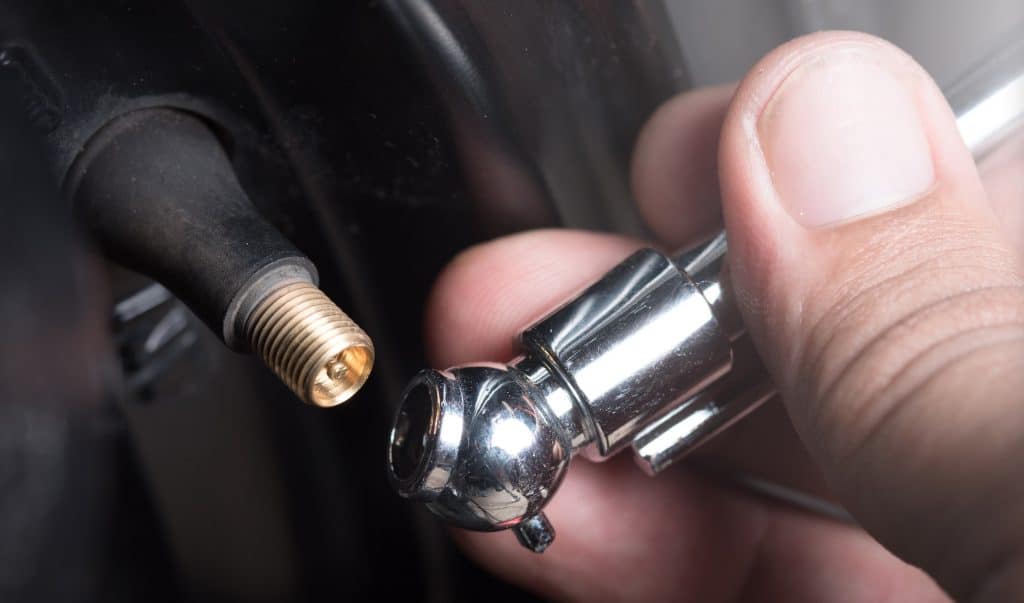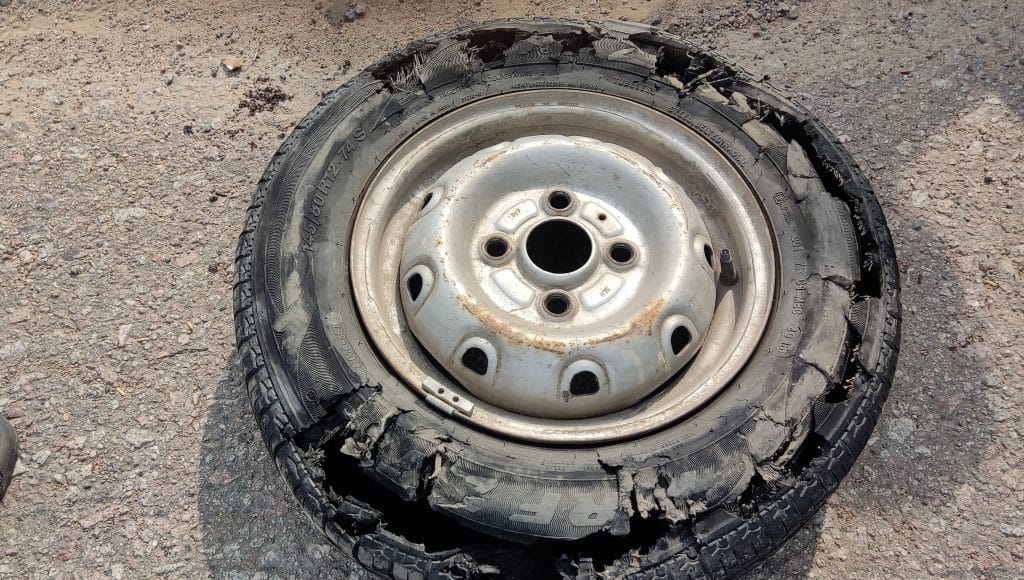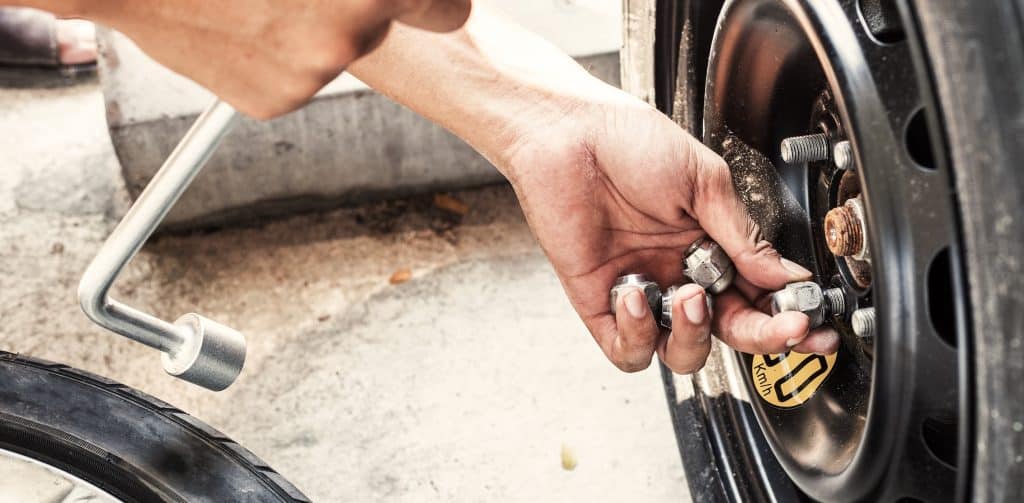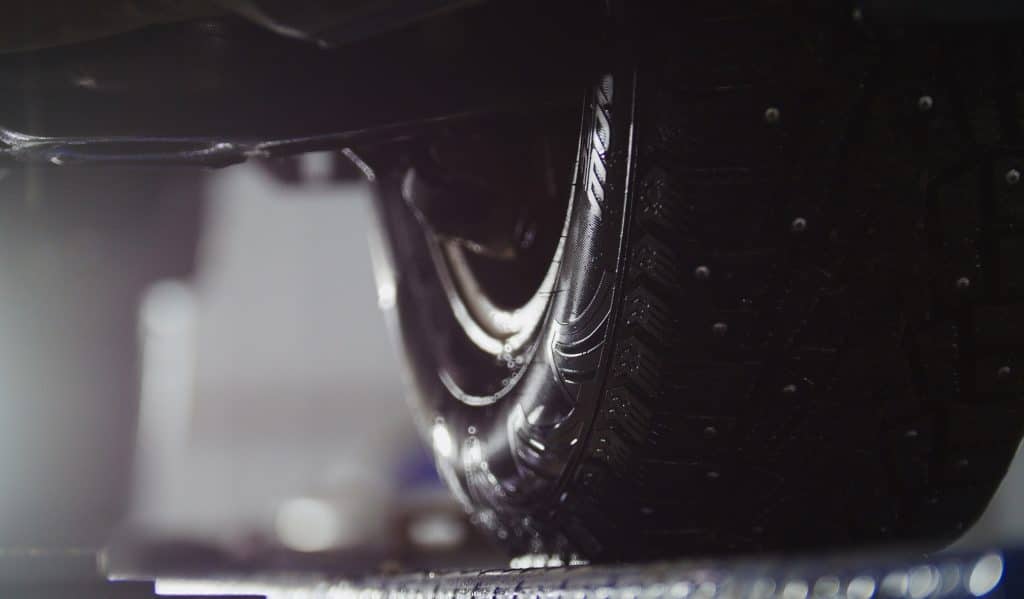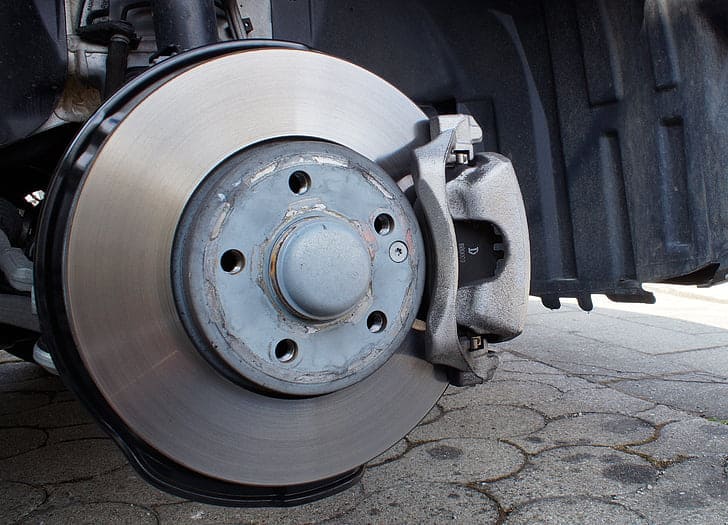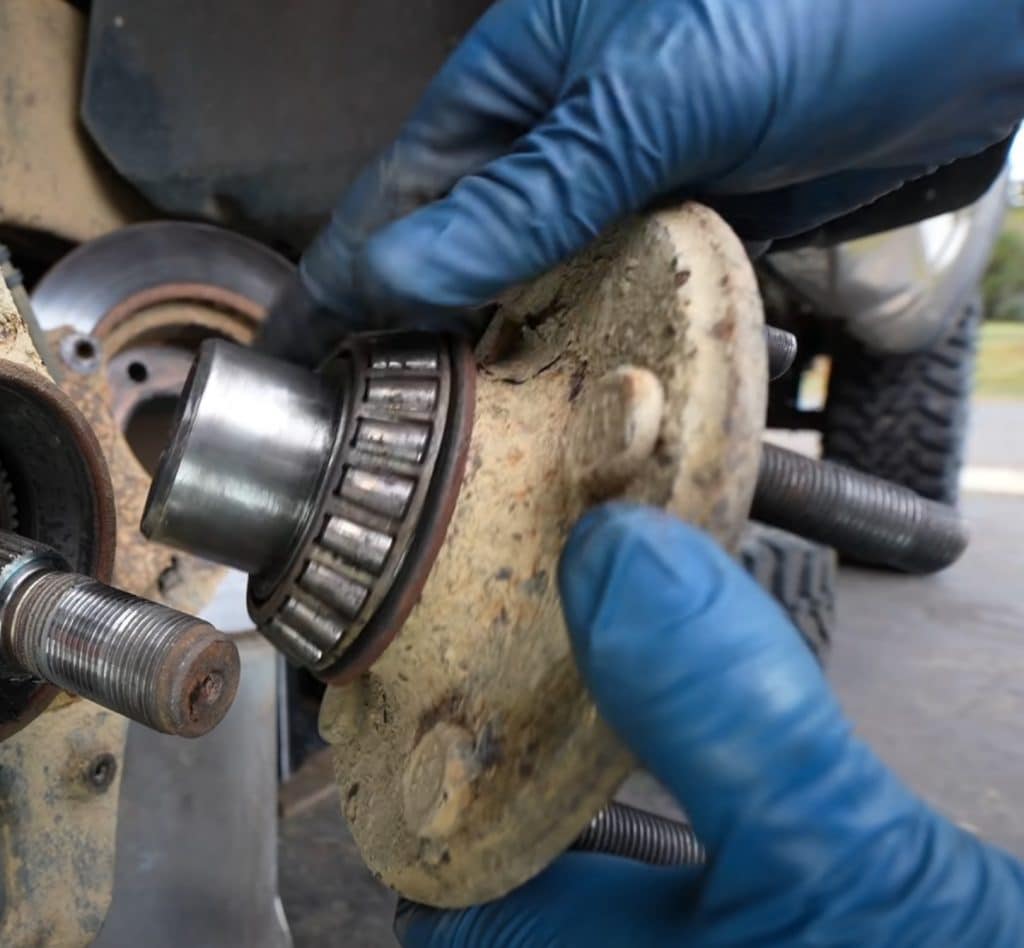If your Kia Optima’s steering wheel is shaking, you should deal with it immediately.
A shaking steering wheel in the Kia Optima is caused by anything from the wheels and tires through the suspension (ball joints, tie rods, etc.) to the braking system. We’ll start with the easiest things to check and move towards things you’d have to bring your Optima into a shop to address.
A great place to start diagnosing a shaky wheel is to determine when it shakes and what (if any) noise it is making. Doing this can help narrow down the potential causes. The table directly below can help you narrow down the causes of shaking steering wheel fast.
Quick Reference Table:
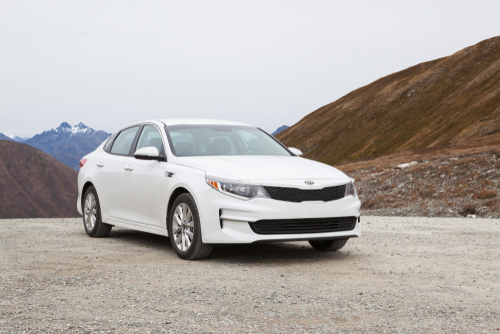
| Cause | Pulls | Noise | Vibration |
| Underinflated Tire(s) | Yes | No | No |
| Overinflated Tire(s) | No | No | No |
| Loose Lug Nuts | No | Rattle | Yes |
| Wheel Alignment | Possible | Possible Humming | Maybe |
| Unbalanced Wheel | No | Typically | Yes |
| Stuck Brake Caliper | Yes | Yes | Yes |
| Bad Wheel Bearing | No | Yes | Usually |
| Suspension | Possible | Possible | Usually |
1. Underinflated Tires
Pulls in the direction of the low tire, no noise (maybe a slight tire hum)
Check the tire pressure on all four wheels if your Kia Optima has a shaking steering wheel. Low tire pressure is the number one reason a steering wheel will shake (and the easiest to check).
An underinflated tire will cause your Optima’s steering wheel to shake. It’ll also cause the car to pull in the direction of the underinflated tire.
Don’t look at the maximum tire pressure listed on the tire. Instead, look for a sticker inside your Optima’s driver’s side door. It’ll list the recommended tire pressure. Don’t trust the tire pressure monitoring system. If you can’t find the sticker, consult the owner’s manual.
2. Overinflated Tires
The steering wheel will feel light (front overinflation), with no noise
An overinflated tire can cause a steering wheel vibration. It will not cause your Optima to pull in any direction noticeably.
Overinflated tires are just as dangerous as underinflated tires. If the tire is inflated past its maximum pressure, it can blow at any time.
3. Loose Lug Nuts
Vibration throughout the whole vehicle, Rattling sound
The audio clip above is what loose lugnuts sound like when driving a vehicle.
If you’ve recently had your Optima’s tires replaced, had your brakes changed, taken a wheel off, or had someone else take the wheel off, it is possible that the lug nuts were not torqued properly. You should check your Optima’s owner’s manual to verify the torque requirements for your model years wheels. Most wheels need between 80-110 ft/lb.
While a shaking steering wheel can be caused by many issues that you shouldn’t ignore, loose lug nuts the wheel can fall off and cause your Optima to crash.
4. Unbalanced Tires/Wheels
A vibration that increases with speed, Possible noise
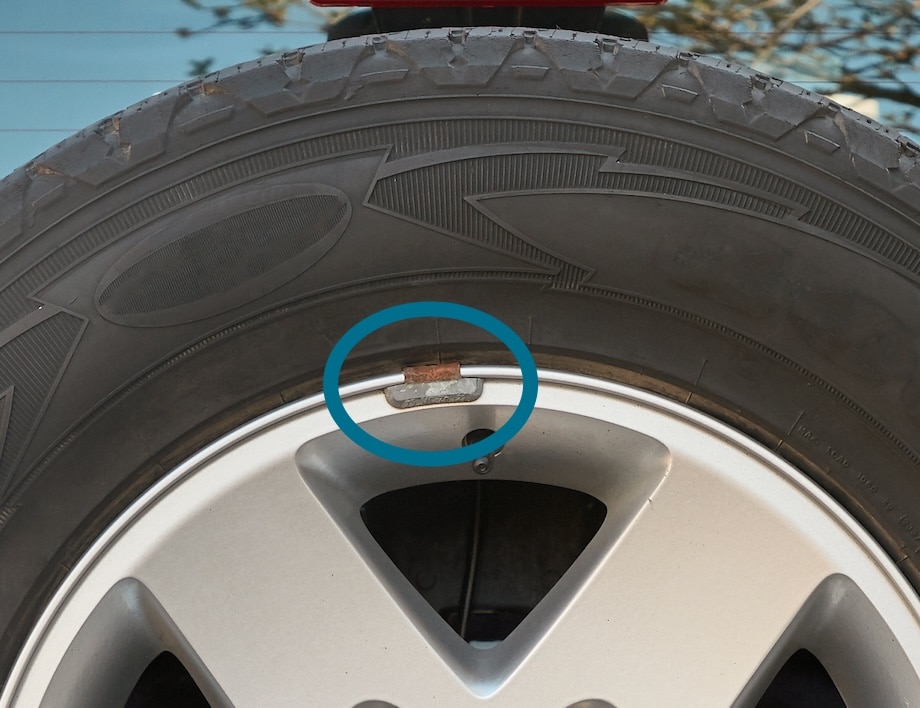
The audio clip above is the typical sound you’ll hear when your Optima has an unbalanced tire (often, there won’t be any noise at all).
If a tire isn’t balanced and properly aligned, your Optima’s Steering wheel will shake. Tires are the most common issue that will cause steering wheel vibrations. It may produce a humming noise at highway speed.
When you have tires put on your Optima, the tire tech uses weights to make sure the tire doesn’t shake at high speed. If one of these wheel weights falls off, the tire will go out of balance and vibrate the steering wheel at speed.
Inspect Each Wheel
Inspect each tire and verify that a wheel weight hasn’t fallen off. Wheel weights can be found on the outside and inside of a wheel. You’ll see where they were. If you suspect your Optima has a wheel that needs balancing, take it to a reputable tire shop and have them balanced. It’s a pretty cheap fix.
5. Wheel Alignment
May pull in one direction, May hum and or vibrate, Uneven Tire Wear
If your tires are not correctly aligned, it can cause your Optima’s steering wheel to shake.
Take a look at the tires. If they aren’t wearing evenly, that’s a symptom that you need a wheel alignment and why you feel your Optima shake while driving. If the tires have worn too unevenly, they’ll likely need to be replaced
Do not buy new tires and skip the alignment if they wore unevenly. If you skip it, it’ll only be a matter of time before the wheels go back to shaking the vehicle.
Here’s a good article from Bridgestone regarding tire wear and alignment.
6. Brakes
Shaking gets worse when stopping
The braking system is one of the most common things that would cause your Optima’s steering wheel to shake at speed.
Stuck Caliper
The caliper is the mechanism that pushes your brake pad into the rotor. If you do have a stuck caliper, your brakes will glaze. Glazing can reduce the effective stopping distance of your Optima. You should also smell the brakes when you aren’t moving since the stuck caliper is cooking them.
If your Optima only shakes when braking, take a look at diagnosing a Optima that shakes when braking and has squeaky brakes. These pages go further into depth on this topic.
Rotors Worn Unevenly
If your brake rotors are no longer a smooth flat surface, it can cause a lot of shaking, particularly when applying the brake pedal.
7. Wheel Bearings
Bad wheel bearings usually make an obvious sound when they shake a steering wheel
Wheel bearings have the thankless job of consistently supporting the weight of your Optima and letting the wheels turn virtually friction-free. If the wheel bearings are damaged, you’ll usually feel it when going around a corner more than when you are going in a straight line.
Bearings usually do this when they need lubrication. They may need to rep if they go too long without service. A bad wheel bearing will usually make a humming noise that gets louder with speed.
8. Suspension Problems
Possible clunking sounds, the wheel may pull
Your Optima’s suspension helps absorb the harsh impact of traveling on the road. But, at the same time, it has to keep the tires making even contact with the road. Bad springs, shocks, sway bars, and many other suspension-related issues can cause the steering wheel to shake. They’ll often make a clunk or a thunk.
Conclusion: Kia Optima Shaking Steering Wheel Diagnosis
Many tire shops can re-balance your tire if a wheel weight falls off. If your tires are worn unevenly, it’s most likely due to wheels that are out of alignment. There are a lot of different issues that can cause your Optima’s steering wheel to shake. Hopefully, this article helped you narrow them down.


